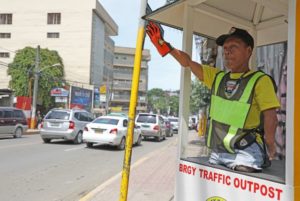
Despite his disability, traffic enforcer
Magdaleno Borces manages to conduct the traffic in Barangay Kasambagan, Cebu City.
Though he doesn’t have legs, he wants to contribute something to the community. He simply wants to serve. — Barangay Captain Franklyn Ong on Borces’ passion to help solve traffic congestion despite his condition
Even before sunlight pierces through the dark sky at dawn, Magdaleno Borces is already up and ready to go.
“Gusto kaayo ko mo-trabaho (I’m excited to work),” he said.
With a reflectorized vest and a whistle, Borces hops on his hands from one spot to another as he moves toward a pedicab parked outside his small shanty in Barangay Kasambagan, Cebu City.
Unlike your regular traffic enforcer, Borces was born without lower legs and with his hands, deformed — a rare congenital disorder known as Amelia.
He has but one finger on his left hand, and three other little fingers on the right.
But the disability did not stop Borces from living a full life.
From his humble abode, the 60-year-old man drives his three-wheel handbike, which was modified to enable his right hand to do the pedaling, while he painstakingly maneuvers the contraption through steep and rocky paths on the way to his work area all by himself.
Borces does not mind the daily struggle.
By 6 a.m ., he is already at his post along F. Cabahug Street where he is assigned to man the traffic.
“Dili ko gusto nga magpuyo lang sa balay. Buot ko motrabaho og makapangalagad sa katawhan (I just don’t want to stay idle at home. I want to work and be able to serve the people),” he said in his soft voice.
For six years now, Borces endures the smoke and dust-filled highway.
He braves the heat and searing temperatures, and works even during heavy rains from Monday to Saturday, from 6 a.m. to 6 p.m. with two breaks in between.
As honorarium, Borces receives P2,000 from the village, and another P4,000 from the Cebu City government every month.
The amount, he said, is enough to buy food, water, and other basic commodities.
Although he has learned to live with his disability and has not experienced much discrimination, Borces said there had been times when he wondered why he did not have the limbs that most people had.
Traffic enforcers from the Cebu City Transportation Office (CCTO) flaunt their snappy parade drills during the 81st Charter Day celebration at Plaza Sugbu.
CDN file photo
While he had every reason to feel sorry for himself, he simply refused to give in to despair.
Borces caught the attention of Kasambagan Barangay Captain Franklyn Ong who personally requested him to man the traffic along one of the barangay’s major streets.
Ong recounts that Borces used to just stay on the pavement and from there, help man the traffic by himself.
“He loves to be on the streets to help maintain an orderly traffic flow. It exposed him to so much risks and so I got him,” Ong said.
Ong said Borces’ dedication was exemplary.
“He’s determined, very passionate, and very hardworking. Though he doesn’t have legs, he wants to contribute something to the community. He simply wants to serve,” he said.
Perched on an outpost specially made for him, Borces does his work with pride and determination as he passionately directs traffic to maintain an orderly flow.
No matter what the job entails, he said that he is determined to lead a life of
purpose.
Though hard-pressed on every side, Borces said begging money from people was never an option for him.
“Dili ko anang magpakilimos. Gusto ko nga ang akong kuwarta, hinaguan gyud (I will not beg. I want the money that I have to be the fruit of my
labor),” said Borces who refuses to receive money from passersby.
He reminded mendicants that poverty and disability are not obstacles to earn a decent living and serve the community.
Though he’s just about a meter in height, Borces stands tall in his unwavering determination and commitment to service.
Like Borces, traffic enforcers spend much of their time under the sun which makes them prone to heat stroke and even hypertension, said Herbert Nuñez, a 60-year-old member of the Traffic Enforcement Agency of Mandaue (TEAM).
A traffic enforcer for 20 years, Nuñez could well attest to the difficulties that come with the job.
“Dili sayon kung anaa naka sa field. Pero tungod sad lagi sa ka-busy sa dalan ug ganahan ka dili ma traffic imong area, ma sakripisyo gyud nimo imong lawas (It’s not easy being on the field. But because the streets are always busy, as a traffic enforcer you don’t want congestion in your area that’s why you really have to sacrifice your health),” said Nuñez.
In 2016, moments after successively apprehending three erring drivers, Nuñez suddenly collapsed in the middle of traffic.
He was rushed to a hospital and later told that he suffered from a heat stroke.
His doctors advised him to rest for one month to gain back his health.
For Ramon Rusiana, a member of the Cebu City Traffic Office (CCTO) for almost 15 years, it is not so much the health hazards that make his job difficult, but the attitude of the public when dealing with them.
He shared that not a single day goes by without verbal tussles with drivers and commuters.
“Nakadungog na guro ko tanang balikas tungod ani atong trabaho (I must have heard all kinds of curses because of this job),” said Rusiana, admitting that hours of exposure under the heat could also make traffic enforcers irritable too.
“Kung motrabaho na ko, magbaon g’yud ko og taas nga pasensiya. Mao ra gyud ni makapaluntad nato.
(That is why every time I go to work, I always see to it that I bring with me a lot of patience. That’s the only way for me to survive my day),” said Rusiana.
(To be continued…)

